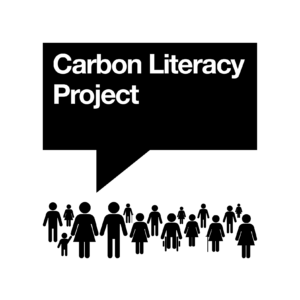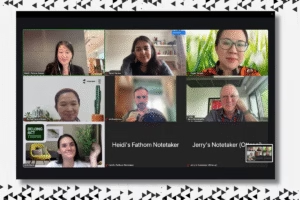From Classroom to Rice Fields: How Far Can Carbon Literacy Training Go?
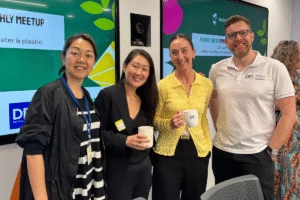
Heidi joined by the DFI team at their office for our Future Green Roundtable Event earlier this year — a great discussion on reuse systems
In today’s fast-changing food sector, sustainability isn’t just an add-on, it’s becoming the heartbeat of resilient business strategy.
Yet, one of the greatest barriers organisations face isn’t a lack of ambition, but a lack of confidence.
How do you know what really makes a difference?
How can you separate good intentions from meaningful impact?
That’s where Carbon Literacy comes in.
Smiles all round at our Carbon Literacy Course
At Future Green, we deliver the Carbon Literacy for the Food Sector programme (explore it here) — a certified training that equips professionals with the knowledge, tools, and clarity to act. More than just another sustainability workshop, it provides a grounding in the science of climate change, the impact of food systems, and, crucially, what can be done. Participants leave not only with new knowledge, but also with the confidence to make pledges and the skills to follow through.
The Power of Pledges: DFI Retail Group’s Carbon Literacy Journey
One of the most compelling stories to emerge from our Carbon Literacy training is that of the DFI Retail Group, a leading Asian retailer.
After completing the course with us, the DFI team shared their pledge to take action in one of the most unexpected but critical areas of food sustainability: rice.
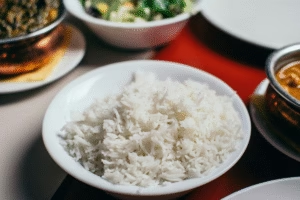
Source: Unsplash – Pille R. Priske
Rice is the staple of Asian diets, eaten daily by billions. But what many don’t realise is that traditional rice cultivation is highly carbon intensive. Flooded paddy fields release significant amounts of methane, a greenhouse gas over 28 times more potent than carbon dioxide. For DFI, rice also represented around 6% of their Scope 3 emissions (based on 2023 data), making it a critical category for action.
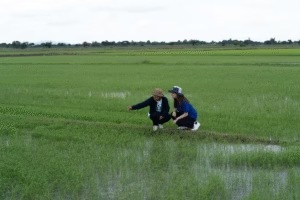
Source: DFI Retail Group
To support their low-carbon rice initiative, members of the DFI team sought to increase their Carbon Literacy, and shared their pledge to deliver low-carbon rice. And they didn’t stop at words. They rolled up their sleeves, reached out to experts, and found partners on the ground. Working with agricultural specialists, the Thai government, and local farmers, they launched a pilot programme in Thailand in 2024.
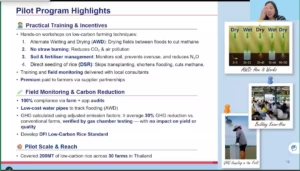
Highlights from their pilot programme: Training farmers, cutting emissions, and scaling low-carbon rice
From Pledge to Pilot: Cutting Overall Emissions by 30%
This pioneering programme introduced techniques such as:
- Alternate Wetting and Drying (AWD): replacing continuous flooding with controlled cycles of irrigation, cutting methane emissions by up to 50% while saving water.
- Straw burning prohibition: preventing the open-field burning of rice straw, reducing both emissions and air pollution.
- Soil and fertiliser management: using data-led approaches to optimise nutrient use and limit nitrous oxide emissions.
The results were extraordinary. The pilot produced 110,000 kg of certified low-carbon rice, achieving at least a 30% reduction in greenhouse gas emissions compared to conventional cultivation.
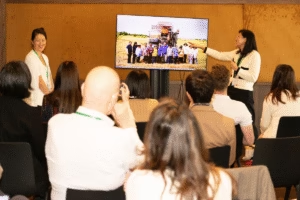
Mae Tse Jain from DFI Retail Group introducing their low-carbon rice initiative at our UnConference 3.0 earlier this year!
And in March 2025, DFI chose to reveal this groundbreaking initiative at the 3rd installment of our UnConference in Hong Kong, an annual event dedicated to bringing together food businesses’ transition to sustainability— a bold signal of their commitment to industry-wide change.
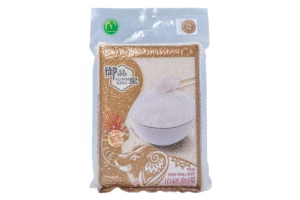
Rice from Yu Pin King brand of DFI Retail Group
Since then, they’ve scaled the programme, launching 200,000 kg of low-carbon rice under their Yu Pin King brand in Hong Kong, bringing sustainable rice to everyday shoppers.
That’s sustainability in action!
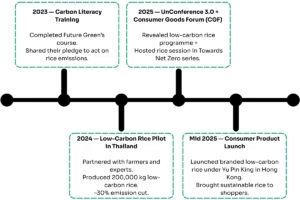
A rough timeline of DFI Retail Group’s low-carbon rice journey
Why Carbon Literacy Builds Confidence to Lead
DFI’s story highlights the essence of Carbon Literacy: it’s not about abstract knowledge, it’s about confidence in action.
- Confidence to Lead: The course empowered the DFI team to step into an industry-wide challenge and lead a conversation others were hesitant to start.
- Confidence to Collaborate: Equipped with shared understanding, the team worked seamlessly across departments and with external partners — from farmers to policymakers.
- Confidence to Communicate: With a deeper grasp of the science and solutions, they could speak about sustainability with clarity and conviction, influencing stakeholders and inspiring customers.
Carbon Literacy builds this bridge — from awareness to bold, tangible action. And in a food system where change is urgent, that bridge is invaluable.
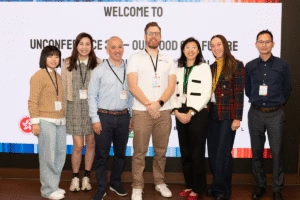
We were honoured to have 7 members of the DFI Retail Group team attend UnConference 3.0!
Closing the Loop: From Learning to Leadership
When knowledge meets confidence, pledges turn into programmes, and sustainability becomes more than a promise, it becomes a practice.
Our Carbon Literacy Course isn’t just about learning; it’s about unlocking the power of people to shape the future of food. As the DFI Retail Group has shown, when teams feel confident, they don’t just join the sustainability conversation — they lead it.
Join our next cohort to be a part of the growing Carbon Literacy Training Alumni!
Enrol now (individuals)
From Paddy to Plate: The Commodity Story of Sustainable Rice with DFI
A deep dive into rice decarbonization: this masterclass with DFI Retail Group explores low-carbon farming in Thailand and the coalitions, financing, and consumer engagement needed to scale sustainable rice production.
Join companies like DFI Retail Group in taking your first step — book a chat with us to explore Carbon Literacy for your organisation.
Click here for more information about our fees.
